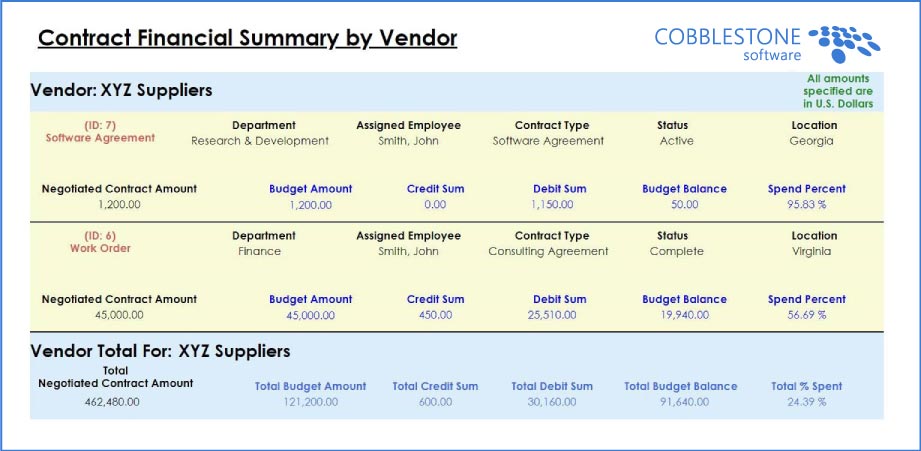When managing contracts, performance monitoring is one of the most important ways to measure success. With a large variety of contracts, all with different terms, it can be difficult to know how you should assess contract performance. Luckily, you can boil down the success of each contract, no matter the complexity, to four key contract performance metrics. Read on to discover how contract management software can help you optimize four key contract performance metrics.
Contract Performance Metrics
Contract performance metrics are the data points to help measure the efficacy and efficiency of contract lifecycle management processes that can directly influence the bottom line of an organization. Four key contract performance metrics include cost, punctuality, reliability, and consistent quality. Measuring and optimizing contract performance metrics usually involves the use of industry-leading CLM software.
#1 – Cost
The most obvious metric you will want to look at is cost. When it comes to business operations, the success of any contract can be simply determined by whether or not the contract is resulting in profit or savings. If you find that a contract causes unforeseen expenditures by not providing enough ROI to compensate, you may need to reassess your contract.
Fortunately, tracking contract financials within leading CLM software allows you to track many budgetary variables within a centralized contract financial data report for enhanced oversight, where you can easily track the following quantities.
- Contract Transactions
- Contract Expenses
- Total Contract Budget
- Remaining Contract Budget
- Percentage of Used Contract Budget
- Percentage of Remaining Contract Budget

#2 – Punctuality
Timeliness is important when it comes to contracts. Each party needs to fulfill their contractual obligations on time, or it can cause major issues for your organization. If the other party consistently fulfills their obligations tardily, you could wind up with an underperforming contract. It is important to monitor the punctuality of the other party to ensure the success of the contract.
Thankfully, you can remain abreast of timely obligations with the help of automated CLM software contract obligations – such as crucial task alerts, date awareness, virtually real-time obligation status reports, milestone tracking, and dynamic graphical dashboards for optimized contract obligation oversight, and more. Rather than trapping contract obligations in static documents and allowing them to linger in the ethers of your mind, you can automate contract obligation tracking in a centralized location – freeing your mind to focus more on CLM strategy.
#3 – Reliability
Finding the right contracting partners and vendors can prove difficult. A reliable working relationship is necessary to ensure the success of your organization’s operations. Assessing your counterparty’s inevitable contract changes in the pre-signature stage of the contract lifecycle and tracking post-signature contract performance contribute to the reliability of your contract counterparty and your contract management system.
Fortunately, leading contract management software can provide you with reliable contract management tracking tools and robust reporting features to help you measure pre-award and post-award contract management processes. Such oversight and trackable data can help you assess counterparty reliability that can inform contract renewal or contract termination decision-making.
#4 – Consistent Quality
Concentrating on high contract output can often lead to poor quality. It is important to ensure that the completed contracts retain consistent high quality to virtually ensure that contractual obligations are successfully fulfilled.
Fortunately, industry-leading CLM software can empower you to create consistent, high-quality contracts with the help of pre-approved contract templates and clauses from a secure language library. You can leverage version tracking and rules-based authoring permissions within a centralized location. Without automated contract authoring tools, your internal stakeholders can find themselves disorganized and frustrated – especially when undesignated personnel inadvertently involve themselves in the contract writing processes outside of their expertise or permissions.
Discover how artificial intelligence with machine learning can help maintain contract language consistency and mitigate overall contract management risk in the video below.
Maximize Contract Performance with CobbleStone Contract Insight®
Robust contract performance management with detailed CLM data analytics oversight begins and ends with CobbleStone Contract Insight. Don’t waste any more time losing contract value and confronting contract performance bottlenecks. See how you can maximize the abovementioned industry-leading contract performance metrics by booking your free demo with a CobbleStone Contract Insight expert.
CobbleStone’s trusted, award-winning, highly-integrated contract management software streamlines the contract management process with optimal governance, reduced friction, and high flexibility from contract requests to renewals. CobbleStone has been a leader in CLM software for over twenty years and is trusted by thousands of contract managers.
CobbleStone’s user-friendly, robust, and scalable solution seamlessly connects with external applications, including MS Word and MS Outlook, and offers VISDOM® AI with machine learning for natural language processing and risk management, as well as VISDOM+ generative AI with chatbot and more. Moreover. CobbleStone’s IntelliSign® eSignatures can make one-off and bulk electronic signing a breeze.
To stay up to date on best practices, industry news, and CobbleStone Software updates, be sure to subscribe to our blog and YouTube Channel.
This article was originally published on November 17th, 2017, and was last updated on October 9th, 2024.
*Legal Disclaimer: This article is not legal advice. The content of this article is for general informational and educational purposes only. The information on this website may not present the most up-to-date legal information. Readers should contact their attorney for legal advice regarding any particular legal matter.